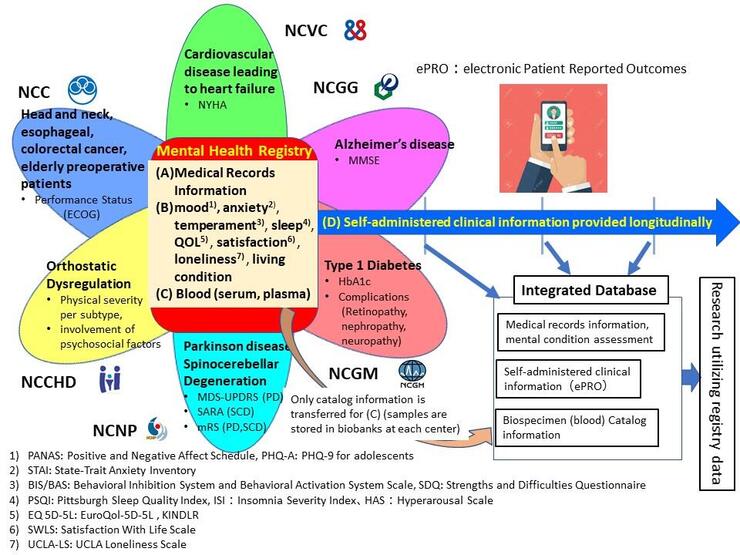Joint research project by 6NC utilizing disease registry on mental health issues throughout the life course
Abstract
Not only in mental disorders, but also in non-communicable diseases (NCDs) such as cancer, cardiovascular diseases, and diabetes, mental health problems affect patients', including adolescents', QOL and social life such as employment and schooling. Therefore, rather than addressing mental health issues by disease or age group, a joint research system among the six national centers (6NCs: National Cancer Center, National Cerebral and Cardiovascular Center, National Center of Neurology and Psychiatry, National Center for Global Health and Medicine, National Center for Child Health and Development, and National Center for Geriatrics and Gerontology) will enable a comprehensive, cross-sectional approach to life stages, and will lead to extension of healthy life expectancy with more universal and subjective satisfaction.
The purpose of this study is to examine the significance of mental health in the medical care of NCDs. To do so, we will establish a patient registry (disease registration system) and use the collected data to examine the bidirectional relationship between mental health and NCDs (e.g., the impact of mental health on physical disease outcomes and the impact of inflammatory changes associated with NCDs on mental health), and how mental health problems affect the QOL and social life of NCD patients. In addition, we will search for biological markers (biomolecules) related to mental health that are common to not only individual physical diseases but also multiple physical diseases.
Also, we will examine the relationship between social environmental factors (school attendance, employment, household composition, social resources), physical symptoms, and biological markers as predictors of severity of physical illnesses, QOL, and other outcomes one year later, and clarify the influence of mental health on the course of illness. Furthermore, we will analyze the extracted biological markers in detail using cultured cells or laboratory animals to elucidate the mechanisms related to mental health.
Perspectives
Through this study, we aim to understand the actual state of mental distress in each NCD and clarify the factors that contribute to it, which will lead to the alleviation of patients' distress and improvement of QOL. When physical symptoms are severe, it is naturally expected that physical symptoms will have a strong impact on mental health. On the other hand, even if the physical symptoms improve, mental distress can be caused by various factors, such as anxiety about the physical disease, restrictions on behavior, and biological changes associated with inflammation, etc. Conversely, it may show how mental health problems affect the outcome of physical diseases and clarify how mental health support should be provided with a view to improving the outcome of physical diseases. Furthermore, if a common biological mechanism involved in mental health can be revealed through experimental analysis of biological markers, it may lead to the development of fundamental treatment methods.
Comments from principal researcher
Kazuyuki Nakagome(National Center of Neurology and Psychiatry President)
The six national centers participating in this study, as National Research Centers for Advanced and Specialized Medical Care, cover a wide range of NCDs and collect clinical information and biological samples in each specialty. By examining the relationship between the information and the information on mental health shared in this study, we expect to obtain highly reliable findings.
In recent years, it has been suggested that mental health problems may not originate only in the brain but may also be caused by systemic factors such as inflammation, immunity, the gut biome?, and glucose and lipid metabolism. In other words, we believe that investigating the bidirectional relationship between NCD and mental health is an important issue that will lead to the extension of healthy life expectancy with subjective satisfaction.

